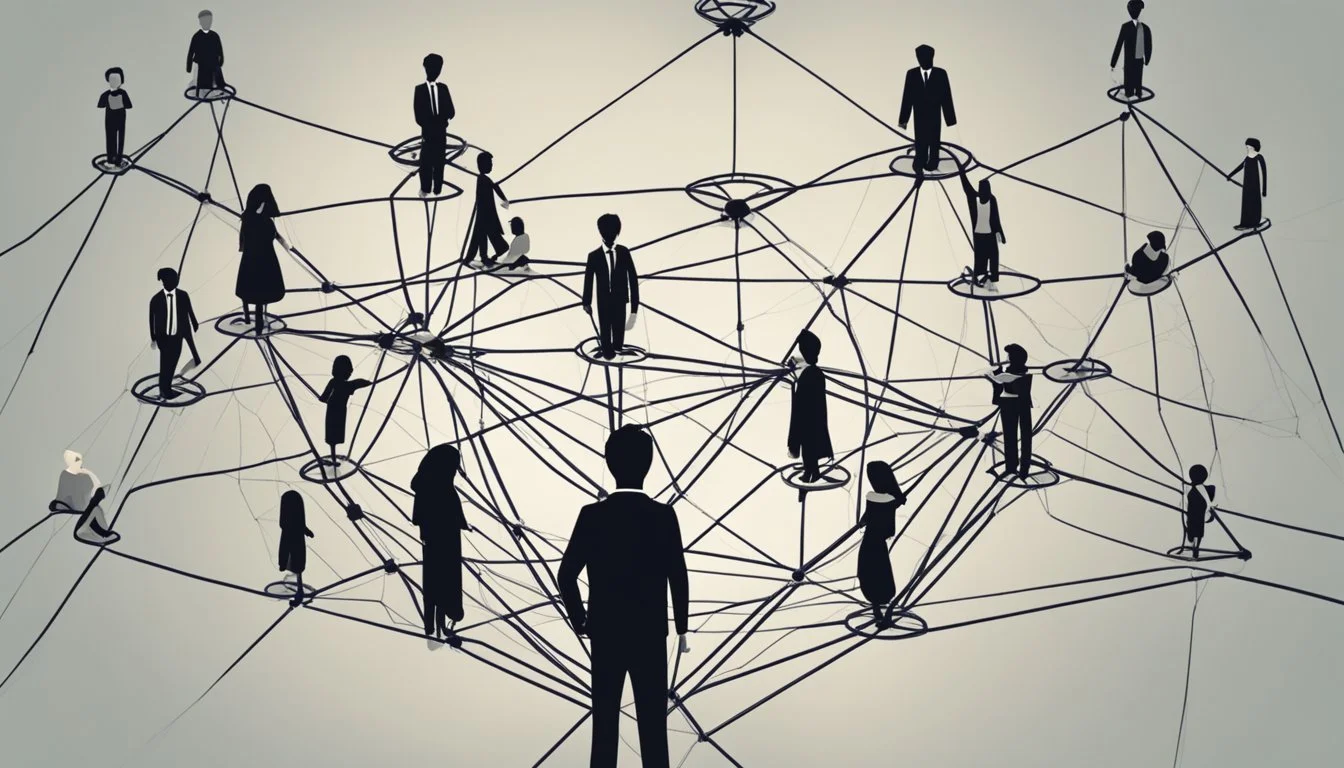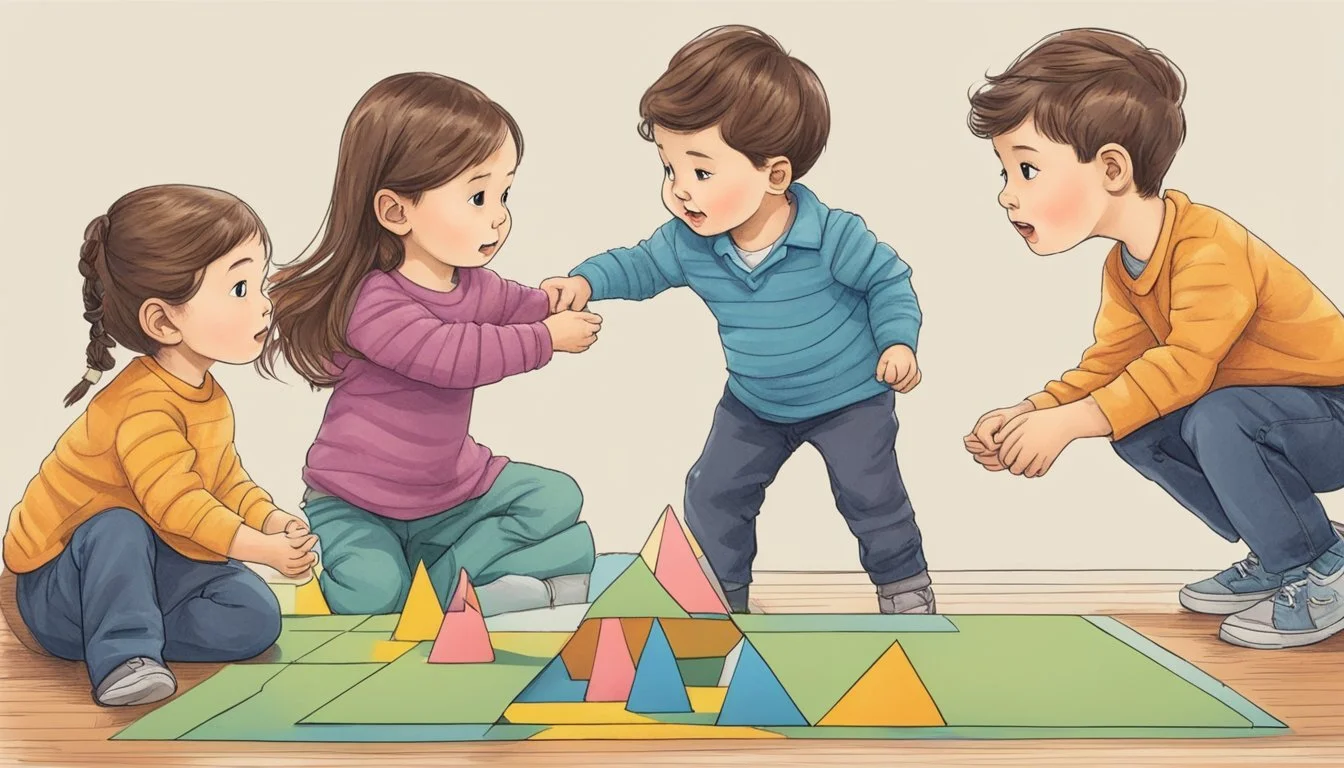9 Ways Narcissists Use Triangulation to Manipulate Extended Family Members
Tactics and Strategies
Narcissistic triangulation is a manipulation tactic frequently employed by individuals with narcissistic traits to control interpersonal dynamics. By involving a third party, these individuals can create conflicts, undermine relationships, and maintain a position of power and influence within a family. This dynamic is especially complex and damaging when extended family members are the targets.
Understanding how narcissists use triangulation in family settings is crucial to recognizing and countering their manipulative behaviors. By learning about the various ways triangulation can manifest, individuals can better protect themselves and their loved ones from the insidious effects of this manipulation. The following article will explore nine specific strategies narcissists use to manipulate extended family members through triangulation.
1) Using Sibling Rivalry to Gain Attention
Narcissists often exploit sibling rivalry to maintain control and manipulate family dynamics. By pitting siblings against each other, they create competition and conflict, which diverts attention back to themselves.
They might assign roles like the "golden child" and the "scapegoat," fostering favoritism and resentment. This manipulation can lead to deep-seated mistrust and emotional damage among siblings.
In family gatherings, a narcissist may highlight one sibling's achievements while belittling another's efforts. This tactic ensures that siblings remain preoccupied with each other rather than uniting against the narcissist's behavior.
Using sibling rivalry also helps narcissists feel superior and in control. They thrive on the chaos and discord they incite, ensuring they stay at the center of family interactions.
2) Playing Favorites with Grandchildren
Narcissistic grandparents often manipulate family dynamics by playing favorites with their grandchildren. This tactic involves lavishing attention, praise, or gifts on one grandchild while neglecting or criticizing others.
This preferential treatment can create competition and tension among the grandchildren. It can undermine sibling relationships and foster resentment and insecurity.
The favored grandchild may feel a disproportionate sense of obligation or indebtedness to the narcissistic grandparent. At the same time, the less favored grandchildren may experience feelings of inadequacy and alienation.
Parents must remain vigilant and address this behavior firmly. Open communication with children about healthy relationships can help mitigate the harm caused by such manipulative tactics.
Narcissistic grandparents using favoritism can significantly disrupt the family environment. It's crucial to recognize these patterns and take action to maintain a balanced and supportive family dynamic.
3) Spreading Misinformation to Create Discord
Narcissists often manipulate family members by spreading misinformation. They may tell one family member that another has made negative comments about them. This tactic sows seeds of distrust.
By creating conflicting stories, narcissists ensure that family members become suspicious of each other. This discord makes it easier for the narcissist to maintain control over the narrative.
Narcissists frequently exaggerate or fabricate situations entirely. Their goal is to keep the family members in a state of confusion.
Family cohesion weakens under constant misinformation. Relationships that were once strong can become strained. The narcissist benefits from this, as they remain the central figure that others must look to for clarity.
Such tactics can leave lasting damage in extended family dynamics. Trust once eroded can be hard to rebuild, and the narcissist often uses this to their advantage.
These manipulative behaviors make it difficult for family members to unite against the narcissist. The constant state of conflict and division serves the narcissist's purpose of maintaining power and control.
4) Flattering One Family Member to Isolate Another
Narcissists often employ flattery as a tool to manipulate family dynamics. By singling out one family member for excessive praise, they create envy and competition among the rest.
They may excessively compliment a sibling for trivial accomplishments. This act sows discord and causes others to feel unappreciated, fueling resentment.
In social gatherings, the narcissist might publicly celebrate one person's qualities, effectively isolating others. This tactic diverts attention and loyalty toward the favored individual, deepening divisions within the family.
The favored family member may begin to side with the narcissist, believing they are genuinely special. This alignment leaves the isolated members more vulnerable to the narcissist's manipulation. This strategy, known as narcissistic triangulation, reinforces the narcissist's control over family relations.
5) Exaggerating Conflicts to Build Alliances
Narcissists often exaggerate conflicts within extended family to build strategic alliances. They may take a minor disagreement and amplify its significance, presenting it as a major issue.
By doing so, they incite drama and manipulate perceptions, fostering divisions. This tactic helps them control the narrative and align family members against each other, solidifying their influence.
Embellishing conflicts also serves to create a sense of loyalty and dependency. Relatives may feel compelled to take sides, believing that the narcissist is the victim of unwarranted attacks, thus reinforcing their allegiance.
Moreover, narcissists manipulate emotions to sway opinions. They portray themselves as aggrieved parties, garnering sympathy and support through selective storytelling. This calculated move ensures that they remain central figures in the family dynamic.
In these scenarios, it's crucial for family members to recognize the pattern of exaggeration. Understanding that the conflict may be inflated can prevent unnecessary rifts and help maintain healthier relationships within the extended family. Maintaining open communication and verifying facts independently can mitigate the narcissist's manipulative influence.
6) Undermining Relationships through Gossip
Narcissists often seek to manipulate extended family members by spreading gossip. They aim to create conflicts and divisions. By sharing selective, exaggerated, or false information, they can control perceptions and relationships.
They may present themselves as a concerned party while subtly denigrating others. This leads to mistrust among family members.
By sowing seeds of doubt, the narcissist can weaken bonds. Family members may start to question each other's intentions and loyalty.
This tactic allows the narcissist to position themselves as the only trustworthy source. Others may feel isolated or compelled to align with them.
Gossip can be especially damaging in tight-knit families. It magnifies minor issues and can lead to significant rifts.
The narcissist remains at the center of attention, continuously feeding the gossip mill. This enables them to maintain control over the family dynamics.
7) Creating Competitions for Affection
Narcissists often manipulate family dynamics by creating competitions for affection. They might frequently praise one family member in front of others. This behavior can breed resentment and jealousy among family members.
For example, a narcissist might constantly compare siblings, highlighting one’s achievements while downplaying the other's. This constant comparison can erode self-esteem and create a rift between siblings.
Another tactic involves favoring one family member over another, leading everyone to compete for the narcissist’s approval. This can destabilize the family unit, causing ongoing conflict.
In some cases, the narcissist may switch their favored family member suddenly. This keeps everyone on edge, never knowing who will be in favor next, and fuels ongoing competition for their affection. This creates a toxic environment where family members struggle to feel secure.
By fostering these competitions, the narcissist ensures that all attention remains focused on them. Family members become preoccupied with earning their favor, often neglecting their own needs and well-being. The resulting atmosphere is one where genuine connections are undermined.
8) Manipulating Family Events and Gatherings
Narcissists often find ways to control and manipulate family events.
One tactic is to engineer a situation where they are the center of attention. This could involve creating drama just before or during the event.
They might also pit family members against each other by spreading gossip or making inflammatory remarks. This creates a tense atmosphere where the narcissist can play the role of mediator to assert dominance.
At times, a narcissist might favor one family member over others publicly. This public display can stir feelings of jealousy and rivalry among relatives.
They sometimes make plans without consulting others, then present the plans as a done deal. This forces everyone to either comply or face being labeled difficult.
Cancelling or rescheduling events last minute is another common strategy. This keeps family members in a constant state of uncertainty, making it easier for the narcissist to control the narrative.
Using events as a platform to introduce and flaunt a new person in their life can also serve as a manipulation tactic. This can cause feelings of inadequacy among family members.
These behaviors are all aimed at maintaining control and keeping family members off-balance. They thrive on the chaos and use these events to reaffirm their importance in the family hierarchy.
9) Claiming Victimhood to Garner Sympathy
Narcissists often manipulate extended family members by portraying themselves as the victim in various situations. This tactic, known as playing the victim, is designed to elicit sympathy and distort perceptions.
By casting themselves as the wronged party, narcissists aim to shift blame onto others. This strategy creates an environment where family members feel compelled to support the narcissist and view them as an innocent sufferer.
This manipulation method disrupts family dynamics, fostering divisions and alliances that favor the narcissist. The constant role of victimhood not only romanticizes their suffering but also makes it difficult for other family members to challenge or criticize them.
Playing the victim can also serve to isolate the targeted individual, making it seem like they are the antagonist. This isolation can lead to a breakdown in relationships and increased dependence on the narcissist for validation and support.
Understanding how narcissists claim victimhood can help family members recognize and counteract these manipulative tactics. By seeing through the facade, they can maintain more balanced and healthy relationships within the family unit.
Understanding Triangulation
Triangulation is a manipulative tactic often used by narcissists to maintain control over relationships and create conflicts among extended family members. It's crucial to understand how this dynamic works and the psychological motives driving it.
Definition and Explanation
Triangulation involves manipulating relationships by introducing a third party into the dynamic. A person with narcissistic traits often uses this to drive a wedge between two people. This technique can manifest in various forms, such as spreading rumors, pitting family members against each other, or presenting oneself as the victim to garner sympathy.
The primary goal is to create confusion and discord, ensuring that the narcissist remains the central figure in the relationship. By doing so, they maintain control and prevent others from forming strong, independent bonds without their influence. Triangulation can cause significant emotional distress and division within families.
Psychological Motives Behind Triangulation
The psychological motives for triangulation are deeply rooted in a narcissist's need for power and validation. By creating conflict, they can position themselves as indispensable or as the sole source of truth and support. This enhances their sense of importance and control.
Additionally, narcissists often fear exposure and criticism. By keeping family members at odds, they divert attention away from their flaws or manipulative behaviors. It also allows them to test the loyalty and boundaries of those around them. The resulting tension and drama serve as a distraction from their insecurities and provide them with a constant stream of the attention they crave.
Understanding these motives can help individuals recognize and respond to triangulation tactics more effectively. Addressing the underlying psychological needs can also be pivotal in neutralizing the influence of a narcissist within the family.
Impact of Triangulation on Family Dynamics
Triangulation by narcissists can significantly disrupt the harmony of extended families and lead to severe emotional and mental health consequences for those involved. This tactic often results in strained relationships and a toxic environment.
Disrupting Harmony in Extended Families
Narcissistic triangulation often leads to a fragmented family unit. When a narcissist introduces a third person into a conflict or disagreement, it creates alliances and oppositions between family members. This can result in deep rifts and divisions, as individuals are pitted against each other.
Family gatherings become tense and uncomfortable. Members find it hard to relax, knowing that any interaction could be turned against them. Trust is eroded, as people begin to question each other’s motives and loyalties.
The overall communication within the family becomes dysfunctional. Instead of open and honest conversations, there is a proliferation of gossip, secrets, and manipulation. These dynamics can have a long-term detrimental effect on the cohesiveness and unity of the family.
Emotional and Mental Health Consequences
The psychological impact on individuals caught in a triangulation scheme can be profound. Constant manipulation and deceit foster an environment of uncertainty and anxiety. Family members may experience chronic stress as they navigate the complex and ever-changing dynamics orchestrated by the narcissist.
Feelings of isolation and betrayal are common. Those targeted by the triangulation may feel alienated from the rest of the family, exacerbating feelings of loneliness and helplessness. Mental health issues such as depression, anxiety, and low self-esteem can become prevalent.
Children in such environments are particularly vulnerable. They might struggle with identity issues and find it difficult to form healthy relationships outside the family. The emotional scars from growing up in a manipulative and toxic family setting can last a lifetime.
Strategies to Counteract Triangulation
When dealing with narcissistic triangulation, establishing clear boundaries and practicing effective communication techniques are vital for maintaining control and mitigating manipulation.
Establishing Boundaries
Establishing boundaries is crucial to protect oneself from the manipulative tactics of triangulation. This involves being clear about personal limits and enforcing them consistently. For instance, if family discussions start to veer into areas where triangulation occurs, one should directly state their discomfort and steer the conversation back to neutral topics.
Maintaining a physical or emotional distance from the narcissist when necessary can also help reduce the potential for manipulation. Acknowledging one's right to privacy and independence ensures that the narcissist's attempts to involve a third party are less likely to succeed. It’s important to communicate these boundaries to all parties involved so that there is no ambiguity about what is acceptable behavior.
A practical approach could include setting time limits on interactions with the narcissist or refusing to be part of conversations where triangulation is a known tactic. This empowers individuals to retain control over their emotions and reactions in these scenarios.
Effective Communication Techniques
Effective communication is another powerful tool against triangulation. This includes being assertive without being aggressive, and using "I" statements to prevent escalation. For example, saying "I feel uncomfortable when conversations shift to this topic" helps in expressing feelings without blaming others.
Listening actively to understand rather than respond immediately can also be beneficial. It shows respect and helps in diffusing the tension created by triangulation. Redirecting conversations back to factual or neutral grounds when manipulation starts becoming evident is another key strategy.
Additionally, involving a neutral third party like a therapist or mediator can help in keeping discussions objective and balanced. This professional support can aid in navigating complex family dynamics where triangulation is used, ensuring that the conversation remains productive and respectful.












